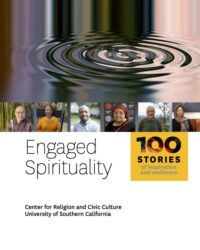CRCC’s project on “spiritual exemplars” expands upon a burgeoning field of research on moral exemplars, primarily undertaken in psychology and moral philosophy. Scholars leading this field ask why we should limit our understanding of human moral functioning by looking at the average; studying exemplars teaches us something about the full range of human potential.
Though scholars note that spirituality is important to exemplars, living or dead, we know little about how it functions for these individuals. This project fills that gap by interviewing people from a wide variety of religious and spiritual perspectives about the role that their values, beliefs and practices play in their lives—as well as how their efforts to advance human flourishing influence their spiritual orientation.
Because the idea of “spiritual exemplar” is highly subjective, CRCC crafted criteria to focus our work on spiritually engaged humanitarians:
- A living individual anywhere in the world;
- Engaged in significant humanitarian work;
- Inspired and sustained by their spiritual values, beliefs and practices;
- Admired and emulated by others within and beyond their community;
- Respects human rights, such as those defined by the Universal Declaration of Human Rights.
By looking at lists of prize winners and soliciting nominations from the public and pitches from our team of journalists, CRCC developed a database of 430 individuals fitting these criteria.
Of those, the project profiled 104 spiritually engaged humanitarians. Forty-two countries are represented in our sample, along with 13 different faith traditions. While our sample is skewed toward humanitarians from the United States, in part because the COVID-19 pandemic limited travel, well over half are from outside the US. Nearly 20 percent are from Africa, 12 percent from Asia, 12 percent from Europe, about 9 percent are from the Middle East and Caucasus, and 8 percent are from Latin America. Overall, slightly less than a quarter of the people profiled were white/European, and almost a quarter were Black/African.
On gender and age, we also have a good distribution. Fifty-seven percent of the exemplars were women. More than half are between 30 and 60 years of age. We initially speculated there might be more men than women, and that the sample would skew older than it did, since exemplars are often recognized later in life. The group includes both a Nobel Prize winner as well as little known figures, working day in and day out to improve their communities.
Read Next:
